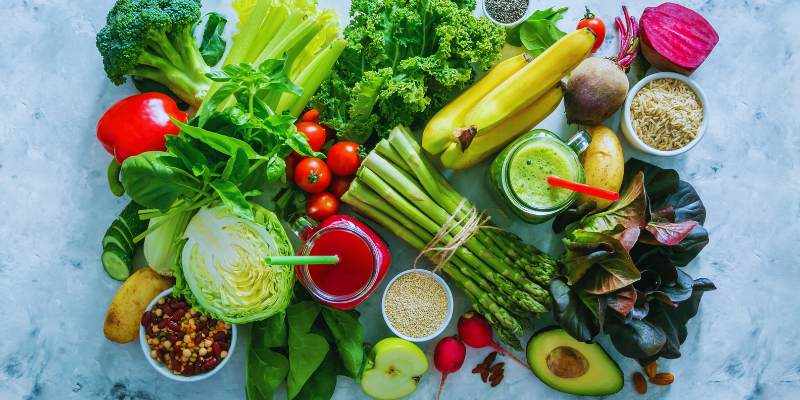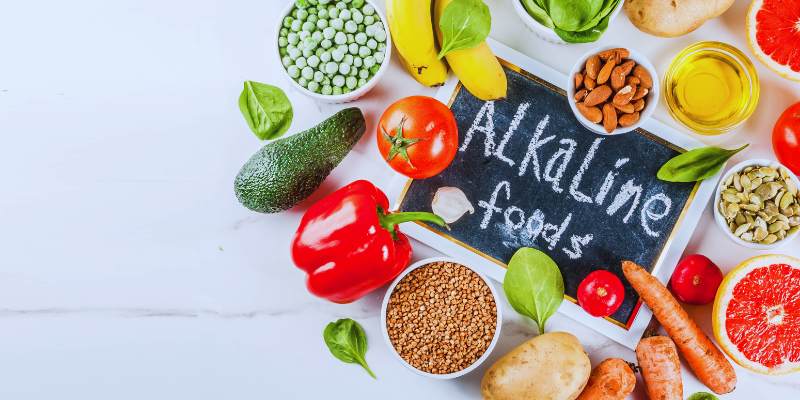The alkaline diet has gained immense popularity for its bold claims about improving human health, balancing pH, and helping lose weight. But what does this diet include, and is it worth the hype? An alkaline diet includes foods (mainly vegetables and fruits) that are basic and are believed to reduce the acidity in the body. The diet also cuts off meat, cheese, eggs, and grains.
Now, what are the actual benefits of an alkaline diet? The alkaline diet offers many benefits to the body, like preventing kidney stones, improving heart health, and reducing inflammation. However, a strict alkaline diet can lead to vitamin and mineral deficiencies. Whether you want to learn more about an alkaline diet or its advantages, keep reading, as this article covers everything!

What Is An Alkaline Diet: An Understanding
Alkaline means something that has a high pH level. The pH levels range from 0 to 14. 7 is neutral, anything under 7 is acidic, and above seven is basic or alkaline. Human bodies, foods, and medicines all have their pH levels. Our bodies maintain specific pH levels in organs, blood, and tissues. For example, the blood’s pH is 7.35-7.45. It can be fatal if someone's blood pH is not within normal ranges. The lungs and kidneys rapidly remove extra acidic or basic components released from digestion. The filtration of these components produces waste, which is removed through sweat, saliva, and urine.
Otherwise, these waste materials can change the pH of your body. Likewise, the foods you eat also impact the pH of your blood. For example, lower pH foods can harm your body. Therefore, the alkaline diet is preferred or considered beneficial for the human body. The alkaline diet sometimes called an alkaline ash diet or acid-alkaline diet, includes food with slightly higher or basic pH. The diet focuses on fresh fruits, beans, seeds, non-starchy vegetables, and nuts. All of these foods are generally alkaline. Plus, one following the alkaline diet also avoids acidic foods.
Alkaline Diet Menu:
Some examples of alkaline foods and beverages include:
- Fruits: Apples, raisins, dates, dried apricots, bananas, figs, prunes, unsweetened grapes, apples, and orange juices.
- Vegetables: Beet greens, dandelion greens, swiss chard, kale, mustard greens, leeks, turnip green, spinach, carrots, cabbage, asparagus and broccoli.
- Spices And Herbs: Fresh dill, coriander, curry powder, dried basil, parsley, oregano, and herbal teas.
- Nuts And Seeds: Pine nuts, chestnuts, and pumpkin seeds.
- Others: Fermented tempeh or tofu, mineral water, soybeans, and quinoa.

Benefits Of An Alkaline Diet
Consuming greater amounts of foods that produce acids may lead to metabolic acidosis. Mild acidosis is an increased acid level in your body within the normal range. Acid levels are higher than the normal range in chronic acidosis. Promoters of an alkaline diet reason that consuming an alkaline diet can lower the risk of diseases linked with chronic acidosis. Some benefits of an alkaline diet include the following:
- May Support Heart Health: Consuming an alkaline diet may improve heart health. It encourages the consumption of fiber-rich plant foods, so it is bound to increase fiber intake. High fiber intake helps lower bad cholesterol (LDL) levels, the primary risk factor for heart disease. A study suggested that people with an alkaline diet met national dietary guidelines for a protective heart. It includes increased consumption of nutrients such as potassium. An alkaline diet also includes food with less saturated fat, which is responsible for raising bad cholesterol levels. Alkaline foods, on the other hand, are low in sodium, ultimately helping lower blood pressure levels.
- It May Prevent Kidney Stones: Consuming an animal protein-rich diet can increase the acid excreted in the urine, lowering pH levels. Lower levels of pH in urine can increase the risk of kidney stones. Meat, fish, and poultry are the reasons for high urine pH levels. Cutting off these foods and increasing the intake of potassium-rich vegetables and fruits can elevate the pH levels of urine, making it more alkaline. It eventually reduces the risk of kidney stones over time.
- It May Help With Weight Loss And Inflammation: The alkaline diet recommends the consumption of more vegetables and fruits and increased water intake. It also includes cutting down on sugar, meat, and processed foods. These are the best choices for maintaining a nutritional and healthy diet and improving overall health. It may help in weight loss because these are healthy food choices. Eating a healthy diet can also help you decrease inflammation. It is the natural result of an injury or infection. Excessive inflammation or chronic inflammation can cause DNA damage, leading to cancer.
Drawbacks Of An Alkaline Diet
Some drawbacks of an alkaline diet are discussed here:
- Lacks Protein: An alkaline diet does not include animal protein like meat. It is restricted to plant-based foods. Vegetarians may not have a problem following this diet. However, many people may be unable to follow this diet due to off-limits food restrictions, including meat. Not eating enough protein can lead to muscle loss and loss of bone mass. It may also limit the growth and development of the immune system. An alkaline diet is unsafe for children, adolescents, and anyone who requires a protein-rich diet.
- Potential Vitamins And Mineral Deficiencies: An alkaline diet suggests cutting out added sugars and processed foods. It includes more fruits, vegetables, and some legumes and beans. Most of the versions also suggest eating no meat. It can increase the risk of deficiencies in minerals, vitamins, and protein or fat. You should take vitamin supplements to fulfill your body's needs. Though fresh food benefits, an alkaline diet cannot meet calorie needs. Entire food groups are cut off without reason, which can also lead to eating disorders.
Conclusion:
An alkaline diet includes fruits, vegetables, nuts and seeds, spices and herbs, and unsweetened beverages. It does not contain animal protein, fish, cheese, bread, or sweets. Adding more fresh produce to your plate can help to improve heart health and aid in weight loss. It also reduces the risk of diseases caused by chronic inflammation. However, you follow such a restricted diet. In that case, you must fulfill your body's need for protein and calcium from other sources, such as supplements. Otherwise, it may lead to vitamin and mineral deficiencies, harming your health. Consult your doctor before adopting an alkaline diet.












